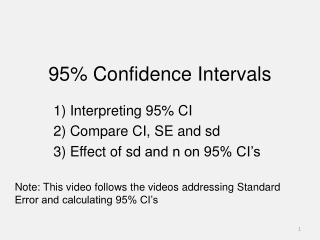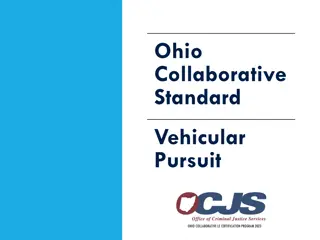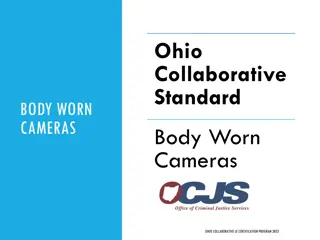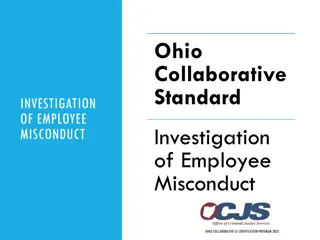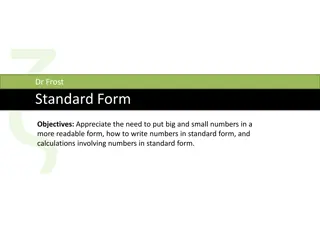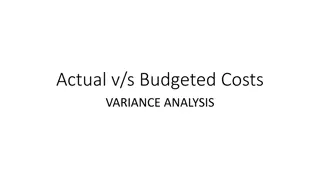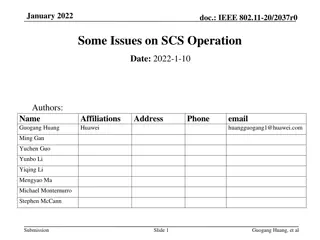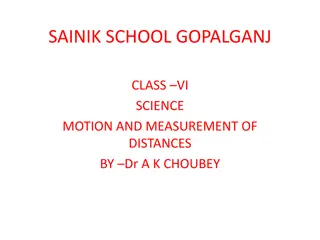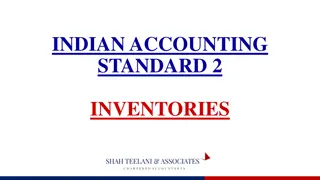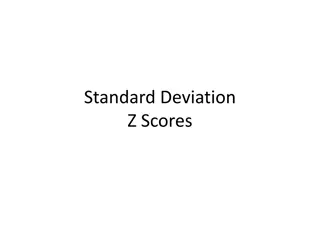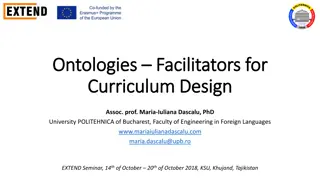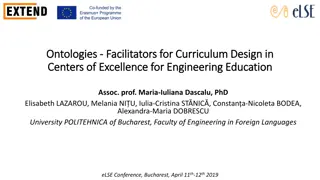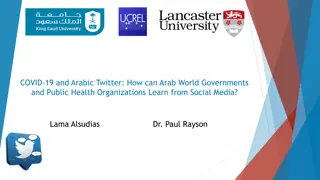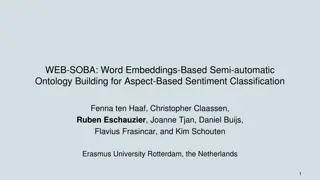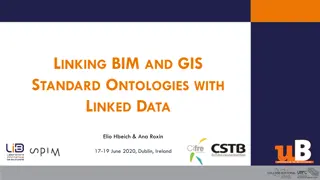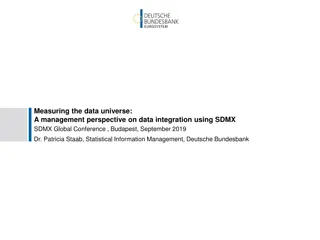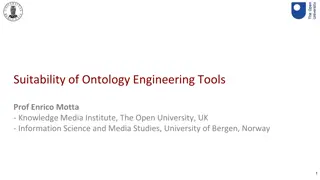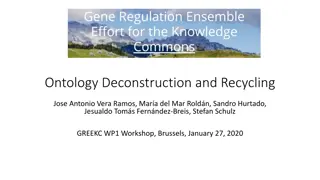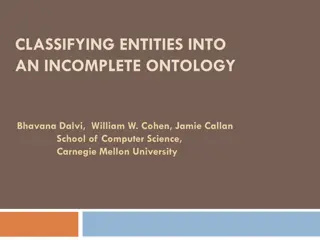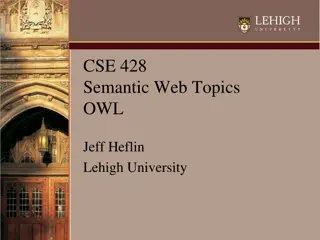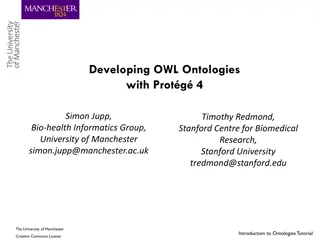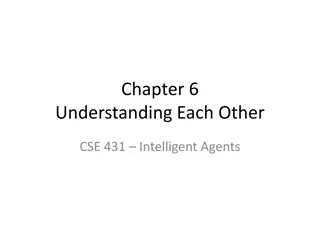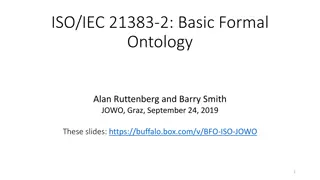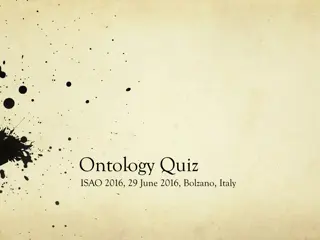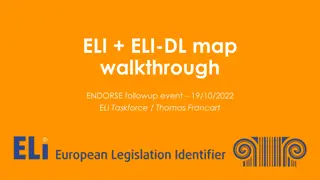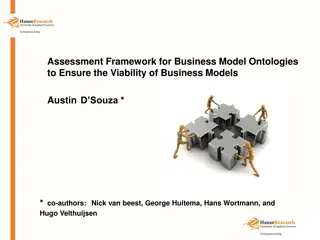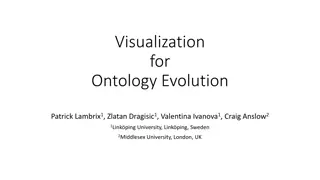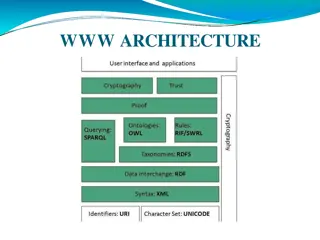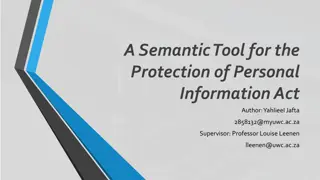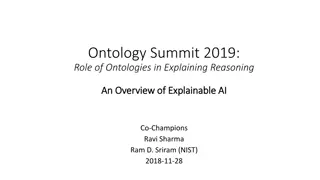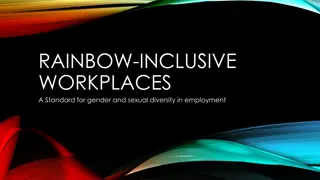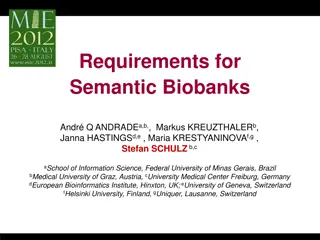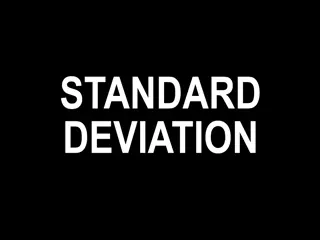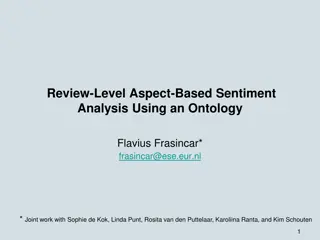Understanding 95% Confidence Intervals in Statistics
Confidence intervals are a key concept in statistics that provide a range within which the true value of an estimate is likely to fall. This video series explores the interpretation of 95% CIs, compares them to standard error and standard deviation, and explains how sample size and standard deviatio
2 views • 8 slides
Ohio Collaborative Standard for Vehicular Pursuit Certification Program 2023
The Ohio Collaborative Community-Police Advisory Board adopted the State of Ohio Standard for Vehicular Pursuit in 2020 to address the risks and dangers associated with vehicle pursuits. This standard aims to govern law enforcement agencies in defining pursuits, criteria for initiation, evaluating c
3 views • 46 slides
Ohio Collaborative Standard for Body-Worn Cameras
The Ohio Collaborative Standard for Body-Worn Cameras outlines guidelines for law enforcement agencies regarding the use of body-worn cameras. It emphasizes the importance of clear policies, accountability, and privacy considerations. Adopted in 2016, this standard aims to enhance trust between poli
0 views • 29 slides
Ohio Collaborative Standard: Investigation of Employee Misconduct
Ohio Collaborative Standard focuses on the investigation of employee misconduct in law enforcement agencies, emphasizing the importance of procedural justice, public respect, and comprehensive investigation processes. It outlines the purpose, learning objectives, and the establishment of written pol
0 views • 29 slides
Understanding Standard Form and Numbers Conversion
Explore the concept of standard form, learn how to write numbers concisely, and practice converting numbers to and from standard form through helpful examples and exercises. Enhance your skills in dealing with big and small numbers efficiently.
2 views • 16 slides
Standard Costing: Understanding Variances in Actual vs. Budgeted Costs
Explore the concept of standard costs, variance analysis, and the importance of investigating variances in actual vs. budgeted costs. Learn to calculate and interpret material and labor variances, overhead variances, and participate in a case study to apply learned concepts. Understand the developme
2 views • 52 slides
Issues with SCS Operation in IEEE 802.11be Standard
The document discusses technical issues related to the SCS (Spatial Channel Sharing) operation in the IEEE 802.11be standard. It highlights inconsistencies in the standard regarding parameterized QoS requirements, mixing of traffic streams with different QoS needs, and challenges in prioritizing SCS
0 views • 15 slides
Understanding Motion and Measurement of Distances in Science at Sainik School Gopalganj
Explore the concepts of motion and measurement of distances in science as taught by Dr. A.K. Choubey at Sainik School Gopalganj. Discover the development of means of transport, different measurement methods like non-standard and standard measures, the significance of measurement, and the Internation
1 views • 16 slides
Indian Accounting Standard 2: Inventories Overview
This article provides an overview of Indian Accounting Standard 2 (IAS 2) on inventories. It covers the objectives, scope, definitions, and measurement of inventories at the lower of net realizable value or cost of purchase. The standard applies to all inventories except financial instruments and bi
2 views • 17 slides
Understanding Standard Deviation, Variance, and Z-Scores
Explore the importance of variation in interpreting data distributions, learn how to calculate standard deviation, understand z-scores, and become familiar with Greek letters for mean and standard deviation. Discover the significance of standard deviation in statistical analysis and the difference b
1 views • 18 slides
Understanding Ontologies in Curriculum Design and Computer Science
Explore the role of ontologies in curriculum design and computer science, delving into their origins, components, and structures. Discover how ontologies facilitate shared conceptualizations and formal specifications in various domains.
0 views • 19 slides
Workplace Exposure Standard for Silica Dust in Stone Benchtop Fabrication
Reduction in workplace exposure standard for respirable crystalline silica dust has been implemented, halving the national standard to 0.05 mg/m3. The new standard aims to protect workers in stone benchtop fabrication businesses from serious lung diseases caused by breathing in silica dust. Employer
1 views • 8 slides
Leveraging Ontologies for Modern Curriculum Design in Engineering Education
Developing a contemporary academic curriculum requires adherence to industry demands, connectivity to global programs, and incorporation of technological tools like ontologies. Discover how ontologies facilitate curriculum design and the transition from conventional to modern approaches, highlightin
0 views • 20 slides
Leveraging Arabic Twitter for COVID-19 Insights
Governments and Public Health Organizations can harness the power of Arabic Twitter to extract valuable insights during the COVID-19 pandemic. By analyzing Arabic tweets, they can uncover topics of discussion, identify rumors, predict tweet sources, and update disease ontologies. Data collection spa
0 views • 20 slides
WEB-SOBA: Ontology Building for Aspect-Based Sentiment Classification
This study introduces WEB-SOBA, a method for semi-automatically building ontologies using word embeddings for aspect-based sentiment analysis. With the growing importance of online reviews, the focus is on sentiment mining to extract insights from consumer feedback. The motivation behind the researc
2 views • 35 slides
Term Overlap Among Matportal Ontologies
The study focuses on term overlap among 5 Matportal ontologies, assessing interoperability and semantic ambiguity. Results show high rates of URI matches between specific ontologies, with discussions on the implications and potential solutions for enhancing interoperability.
0 views • 7 slides
Linking BIM and GIS Standard Ontologies with Linked Data
Introduction to the need for seamless data interpretation between Building Information Model (BIM) and Geographic Information System (GIS), focusing on aligning BIM and GIS standard ontologies for semantic interoperability. Addressing the challenges of data interoperability layers and the characteri
0 views • 15 slides
Managing Data Integration: A Management Perspective
The data universe is expanding rapidly, leading to challenges in organizing and extracting valuable information. Dr. Patricia Staab discusses the importance of integrating data using SDMX at the SDMX Global Conference in Budapest. The approach involves moving towards an application-driven architectu
0 views • 12 slides
Challenges and Opportunities in Ontology Engineering Tools
Prof. Enrico Motta discusses the limitations of current ontology engineering tools, emphasizing the need for better support for creating ontological specifications. The lack of tools that offer a knowledge-level perspective and assist in sensemaking, navigation, and identifying relevant definitions
0 views • 5 slides
Ontology Deconstruction and Recycling Methodology
Development of a generic method for grooming the ecosystem of knowledge commons, addressing obsolescence, re-using content, and concentrating on popular well-maintained ontologies. The relevance for GREEKC and GRAO is explored, highlighting the importance of maintaining and updating publically avail
0 views • 17 slides
Understanding Contexts: A Meta-Ontological Approach
Ontologies provide a general representation of reality, but knowledge is mostly context-dependent. Analyzing different types of contexts, from linguistic to manufacturing, remains a challenge. This study aims to deepen the understanding of the ontological nature of contexts by leveraging a meta-onto
0 views • 14 slides
Classifying Entities into an Incomplete Ontology: Exploratory EM Approach
The research discusses methods for hierarchical classification of entities into incomplete ontologies. It explores the challenges of evolving web-scale datasets and the need for classifying entities in an incomplete ontology structure. The Hierarchical Exploratory EM model is detailed, providing ins
0 views • 27 slides
Understanding Semantic Web Modeling with OWL and Ontologies
Explore the fundamentals of Semantic Web modeling through OWL and ontologies, covering topics like property chain axioms, equality vs. inequality in URIs, sets of distinct individuals, and all values from constraints. Learn how these concepts shape the representation and relationships within linked
0 views • 15 slides
Introduction to Developing OWL Ontologies with Protégé 4
Explore the world of developing OWL ontologies with Protégé 4 through a comprehensive tutorial by Simon Jupp and Timothy Redmond from Stanford Centre for Biomedical Research and the University of Manchester. Learn about OWL introduction, Protégé 4 interface, compositional approach, and the signi
0 views • 44 slides
Understanding Intelligent Agents and Semantic Networks in Computing
Explore the world of intelligent agents, XML, RDF, OWL, ontologies, and class constructors in computing. Delve into how these technologies enable machines to understand, communicate, and process data efficiently.
0 views • 23 slides
Understanding ISO/IEC Standards and Ontologies in Information Technology
Exploring the world of ISO/IEC standards and formal ontologies as presented by Alan Ruttenberg and Barry Smith at JOWO Graz in 2019. The slides cover topics such as basic formal ontology, connectors, domain ontologies, top-level ontologies, and the requirements for being a top-level ontology. ISO/IE
0 views • 97 slides
Ontology Quiz: Test Your Knowledge on Computational Logic and Philosophy
Delve into the world of ontology with this quiz featuring questions on computational complexity, mereology, standardization of OWL, and foundational ontologies. Test your understanding on topics such as first-order predicate logic, parthood in mereology, and more. Challenge yourself and expand your
0 views • 45 slides
Understanding ELI and ELI-DL: A Comprehensive Overview
ELI and ELI-DL are frameworks formalized as ontologies for describing documents and activities, providing a descriptive but non-prescriptive approach. They utilize a model based on FRBR to categorize documents and their subdivisions, with ELI focusing on legislative acts and ELI-DL on documents duri
0 views • 29 slides
Assessing Business Model Ontologies for Sustainable Business Viability
This research delves into the assessment framework for business model ontologies to ensure the sustainability and viability of business models. It focuses on embedding decentralized energy supply within a combined energy infrastructure to create new business models. The study aims to identify the mo
0 views • 21 slides
Visualizing Ontology Evolution for Improved Knowledge Management
Ontologies are dynamic entities that evolve over time, impacting semantically-enabled applications and knowledge acquisition. This work focuses on identifying desired functionalities for ontology evolution systems, highlighting the steps involved in ontology evolution, and emphasizing the importance
0 views • 16 slides
Understanding Web Technologies: From Identifiers to FTP
Explore the world of web technologies from identifiers and character sets to data interchange frameworks and ontologies like OWL. Learn about semantic web layers, cryptography, and FTP protocol objectives. Discover how these technologies work together to create a seamless online experience.
0 views • 72 slides
Semantic Tool for Personal Information Protection
Semantic Tool for the Protection of Personal Information Act is a project led by Yahlieel Jafta, aiming to establish a knowledge base using ontology to assist individuals and organizations in interpreting the Act. The project focuses on the importance of ontologies in extending knowledge and enablin
0 views • 17 slides
Evolution of AI and the Role of Ontologies in Explainable AI
The Evolution of AI from prehistory to the modern era, exploring key milestones in the development of Artificial Intelligence. It covers the transition from early Neural Networks to the current focus on Explainable AI, highlighting DARPA's XAI program and techniques for achieving a balance between p
0 views • 7 slides
Understanding Standard Molar Enthalpies of Formation
Formation reactions involve substances being created from elements in their standard states, with the enthalpy change known as the standard molar enthalpy of formation (Hf). This enthalpy represents the energy released or absorbed when one mole of a compound is formed from its elements in their stan
0 views • 13 slides
Rainbow-Inclusive Workplaces Standard: Promoting Diversity in Employment
The Rainbow-Inclusive Workplaces Standard (NZS 8200:2015) is a groundbreaking initiative in New Zealand, setting guidelines for organizations to create inclusive and safe workplaces for individuals of diverse sexual orientations and gender identities. The standard aims to address discrimination and
0 views • 30 slides
Requirements for Semantic Biobanks and Global Biobank Data Retrieval
Explore the critical aspects of semantic interoperability in biobanking, highlighting the need for formal ontologies, comprehensive annotations, and model of meaning data. The (Generalized) Biomedical Retrieval Scenario underscores the importance of effective resource retrieval based on content-base
0 views • 16 slides
Understanding Standard Deviation and Standard Error of the Means
Standard deviation measures the variability or spread of measurements in a data set, while standard error of the means quantifies the precision of the mean of a set of means from replicated experiments. Variability is indicated by the range of data values, with low standard deviation corresponding t
0 views • 7 slides
Ontology-Driven Review-Level Aspect-Based Sentiment Analysis
This study presents an innovative approach to sentiment analysis at the review level, focusing on aspect-based sentiment analysis (ABSA) using ontologies. Motivated by the increasing volume of product reviews online, the research addresses the challenge of detecting sentiment associated with aspects
0 views • 30 slides
Prototyping AI Component for Fuzzy Matching in Controlled Vocabulary Terms
This roadmap outlines the development of an AI component that utilizes fuzzy matching to help users find controlled vocabulary terms. The process involves user input, AI searching, and user validation, aiming to streamline term selection and minimize manual steps. The system integrates thematic dict
0 views • 17 slides
Comprehensive Guide to Ontology Editors and IDEs for Ontologies
Explore a wide range of Ontology Editors and Integrated Development Environments (IDEs) for managing ontologies efficiently. From simple text editors to advanced IDEs like Protégé and Web Protege, learn about various tools and syntax options available. Dive into Ontology Editors like Protégé 4.3
0 views • 16 slides
